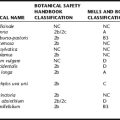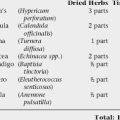RED CLOVER
Botanical name: Trifolium pratense
Synonyms: Meadow clover, purple clover, trefoil
Part used: Flowering tops and leaf
IN VITRO, ANIMAL, AND CLINICAL DATA
for other dietary isoflavones that might confound study results.
SAFETY INFORMATION: HERB DRUG INTERACTIONS, TOXICITY, AND CONTRAINDICATIONS
Red clover is widely used in Europe and the United States for the prevention and treatment of menopausal complaints with a very high safety profile. Although there are a limited number of human clinical trials using this herb, even those looking at effects up to a year show excellent tolerance and no significant adverse effects. It is theoretically contraindicated for women taking HRT due to possible competition with the drugs. Red clover has also been contraindicated with heparin, ticlopidine, and warfarin, based on its coumadin content. However, unless red clover herb is fermented, it is unexpected to have any anticoagulant effects.








